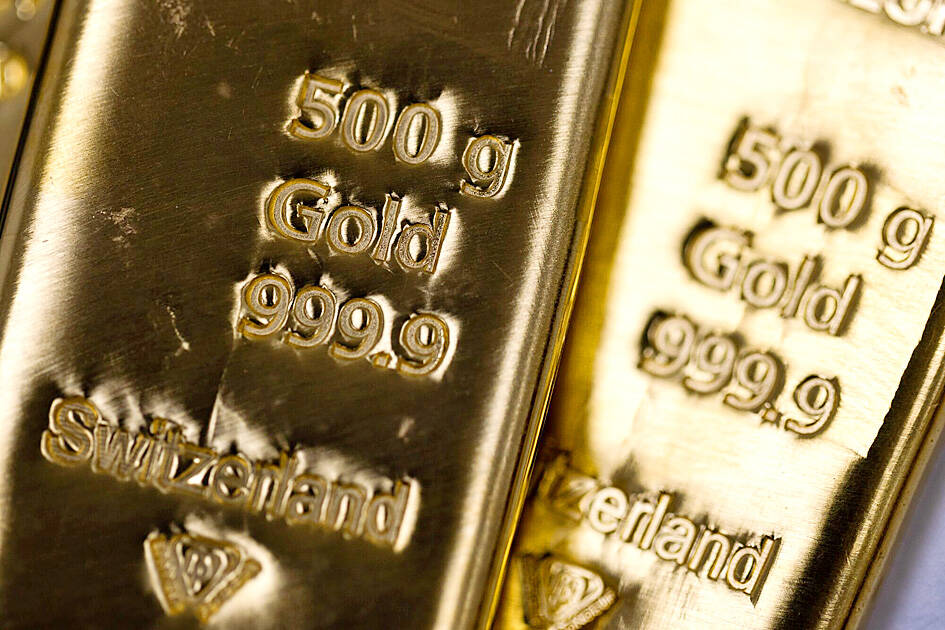Gold prices reached a record high yesterday, with safe-haven demand continuing to support prices as traders monitored escalating tensions in the Middle East and the increasingly tight US presidential election race.
Bullion climbed to an all-time high of about US$2,732.82 an ounce, topping last week’s peak by a few dollars. The bullish sentiment has also spilled over to silver, which was trading at the highest since 2012, while palladium and platinum also rose.
Meanwhile, oil prices edged higher following a more than 7 percent drop last week, with Brent crude futures up 1 percent at US$73.76 a barrel, and US West Texas Intermediate crude futures up 1.17 percent to US$70.74 a barrel.

Photo: Bloomberg
Markets are focused on geopolitical risks in the Middle East, with Israel discussing its next attack on Iran after a Hezbollah drone exploded next to Israeli Prime Minister Benjamin Netanyahu’s private home on Saturday.
US President Joe Biden and his administration have urged the renewal of ceasefire negotiations in the region, although Israeli hardliners oppose concessions.
Traders were also repositioning portfolios ahead of the US election on Nov. 5.
Polls show the contest between former US president Donald Trump and US Vice President Kamala Harris could be the closest in a generation. Investors typically seek safety in gold in times of geopolitical and economic uncertainty.
Gold futures might rise to average US$3,000 an ounce in the fourth quarter of next year, Commonwealth Bank of Australia analyst Vivek Dhar said in a note on Monday.
The US Federal Reserve’s rate-cutting cycle would likely drive weakness in the US dollar, he added. A lower greenback makes bullion cheaper for many buyers, as it is priced in the US currency.
Bullion is one of this year’s strongest performing commodities, with gains of more than 30 percent so far this year. Rate-cut optimism fueled the most recent advances as the Fed kicked off its easing cycle last month. Robust central bank buying has also been a long-standing pillar of support for gold prices.

When an apartment comes up for rent in Germany’s big cities, hundreds of prospective tenants often queue down the street to view it, but the acute shortage of affordable housing is getting scant attention ahead of today’s snap general election. “Housing is one of the main problems for people, but nobody talks about it, nobody takes it seriously,” said Andreas Ibel, president of Build Europe, an association representing housing developers. Migration and the sluggish economy top the list of voters’ concerns, but analysts say housing policy fails to break through as returns on investment take time to register, making the

‘SILVER LINING’: Although the news caused TSMC to fall on the local market, an analyst said that as tariffs are not set to go into effect until April, there is still time for negotiations US President Donald Trump on Tuesday said that he would likely impose tariffs on semiconductor, automobile and pharmaceutical imports of about 25 percent, with an announcement coming as soon as April 2 in a move that would represent a dramatic widening of the US leader’s trade war. “I probably will tell you that on April 2, but it’ll be in the neighborhood of 25 percent,” Trump told reporters at his Mar-a-Lago club when asked about his plan for auto tariffs. Asked about similar levies on pharmaceutical drugs and semiconductors, the president said that “it’ll be 25 percent and higher, and it’ll

CHIP BOOM: Revenue for the semiconductor industry is set to reach US$1 trillion by 2032, opening up opportunities for the chip pacakging and testing company, it said ASE Technology Holding Co (日月光投控), the world’s largest provider of outsourced semiconductor assembly and test (OSAT) services, yesterday launched a new advanced manufacturing facility in Penang, Malaysia, aiming to meet growing demand for emerging technologies such as generative artificial intelligence (AI) applications. The US$300 million facility is a critical step in expanding ASE’s global footprint, offering an alternative for customers from the US, Europe, Japan, South Korea and China to assemble and test chips outside of Taiwan amid efforts to diversify supply chains. The plant, the company’s fifth in Malaysia, is part of a strategic expansion plan that would more than triple

Taiwanese artificial intelligence (AI) server makers are expected to make major investments in Texas in May after US President Donald Trump’s first 100 days in office and amid his rising tariff threats, Taiwan Electrical and Electronic Manufacturers’ Association (TEEMA, 台灣電子電機公會) chairman Richard Lee (李詩欽) said yesterday. The association led a delegation of seven AI server manufacturers to Washington, as well as the US states of California, Texas and New Mexico, to discuss land and tax issues, as Taiwanese firms speed up their production plans in the US with many of them seeing Texas as their top option for investment, Lee said. The